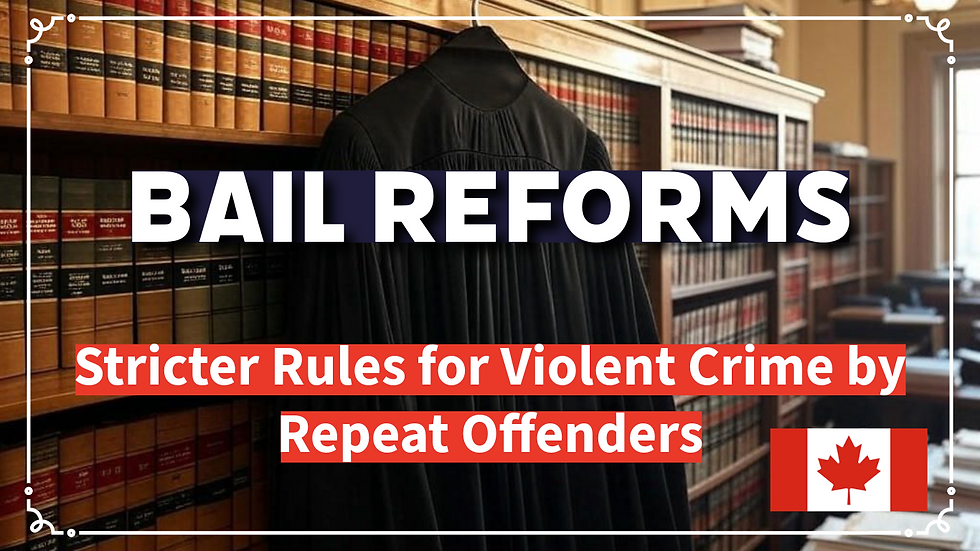Default Bail
- M.R Mishra

- Jan 26, 2024
- 3 min read
Default bail is a legal provision that allows an accused person to be released on bail if the investigating agency fails to submit a charge sheet within a stipulated time frame. In many jurisdictions, including India, the law prescribes a specific period within which the investigating agency must file a charge sheet after the arrest of an accused. If this deadline is not met, the accused may be entitled to default bail.
In India, Section 167(2) of the Code of Criminal Procedure (CrPC) lays down the provisions related to default bail. According to this section, if the investigation is not completed within the specified time (usually 60 or 90 days, depending on the nature of the offense), the accused has the right to be released on bail.
It's essential to note that the specific details of default bail provisions can vary from one jurisdiction to another, and legal interpretations may differ. Therefore, it's advisable to consult the relevant legal provisions and seek advice from a legal professional for jurisdiction-specific and up-to-date information.
The Supreme Court of India has on January 24 cancelled the statutory bail of former DHFL promoters Kapil Wadhawan and Dheeraj Wadhawan, accused in a multi-crore rupees bank loan scam case, had their bail cancelled by the Supreme Court on Wednesday.
Key Points:
Default bail: This refers to the automatic right to bail granted to an accused person under Section 167 of the Code of Criminal Procedure (CrPC) if the police or investigating agency fails to complete the investigation and file a chargesheet within the stipulated time period.
Ruling: The Supreme Court held that filing a charge sheet, even an incomplete one, against an accused negates the right to default bail, regardless of the status of the investigation against other co-accused.
Reasoning: The court reasoned that taking cognizance of a charge sheet signifies the initiation of judicial proceedings against the accused. Once this happens, the presumption of innocence shifts to a requirement for the prosecution to prove guilt. In such a scenario, the right to default bail, which is linked to the pre-trial stage, becomes inapplicable.
Exceptions: There are a few exceptions to this rule, where even after filing a charge sheet, an accused might be entitled to default bail. These include situations where the charge sheet is filed without valid sanction, in violation of mandatory procedures, or if the accused is a juvenile or woman.
Implications:
This ruling clarifies the legal position regarding default bail and sets a stricter threshold for its application.
It may discourage the practice of filing incomplete chargesheets solely to prevent accused persons from claiming default bail.
However, it could also potentially prolong detention periods for accused persons, particularly when co-accused investigations remain incomplete.
Further context:
This ruling comes after a series of conflicting decisions by various courts on the issue of default bail in cases with co-accused or incomplete chargesheets.
It is important to note that this particular judgement applies to a specific set of circumstances and should not be interpreted as a definitive statement on default bail in all situations.
"We have no hesitation that the chargesheet having been filed and cognisance being taken in due time, respondents could not have claimed statutory bail as a right. HC and the lower court greatly erred. Trial court to hear afresh on regular bail. Appeals are allowed accordingly,"
The Supreme Court underscored that, in light of the prompt filing of the charge sheet and the taken cognisance, the respondents could not assert statutory bail as an inherent right.
As per the provisions outlined in the Code of Criminal Procedure (CrPC), an accused is eligible for statutory bail if the investigating agency fails to submit a charge sheet within 60 or 90 days, depending on the circumstances. In this specific case, the CBI filed the charge sheet on the 88th day following the registration of the FIR. Subsequently, the trial court granted default bail, and this decision was upheld by the Delhi High Court.
The Wadhawan brothers were apprehended on July 19 the previous year in connection with the case. While the high court clarified that it did not delve into the case's merits, the charge sheet was formally filed on October 15, 2022, with due cognisance.
The case originated from a complaint lodged by the Union Bank of India, leading to the filing of the relevant FIR. The Wadhawans stand accused in a ₹34,615-crore bank fraud case, facing multiple charges of alleged cheating and fraud.
Kapil Wadhawan served as the Chairman and Managing Director of DHFL, while Dheeraj Wadhawan, Kapil's brother, held a non-executive director position in the company. Both individuals were on the board of DHFL.
In August 2023, seven police officers were arrested for providing preferential treatment to the Wadhawan brothers. This followed the broadcast of clips by a TV channel depicting them enjoying various privileges under the guise of medical check-ups at government hospitals in Mumbai while in judicial custody.
Thanks for Giving your precious time.!!
Refrence:
CrPC
htps://www.livemint.com/companies/people/supreme-court-cancels-statutory-bail-of-dhfls-kapil-wadhawan-11706074598545.html






Comments